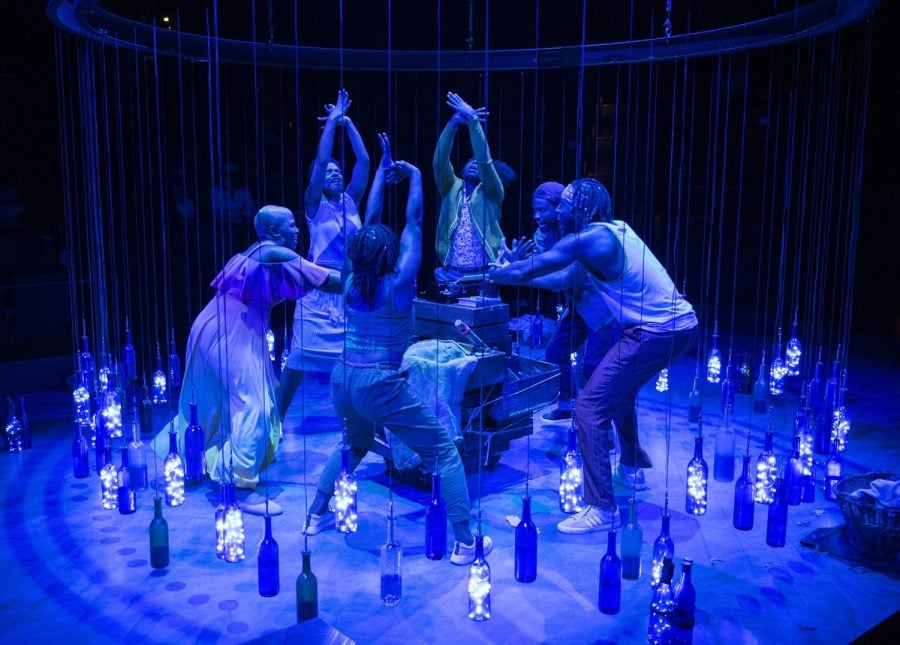Tasia A. Jones and Gabby Randle-Bent co-direct ‘1919,’ a lyrical exploration of Black resistance and hope in Chicago
Photo by Michael Brosilow. Courtesy of David Rosenberg
“1919” is a lyrical exploration of Black resistance and hope after the killing of Eugene Williams in Chicago.
October 30, 2022
Steppenwolf Theatre presented “1919” this October, a lyrical play about the 1919 murder of Black teenager Eugene Williams near Chicago’s segregated lakeshore. The story, adapted by J. Nicole Brooks from Eve L. Ewing’s poetry collection of the same name, explores Black resistance, fortitude and hope.
“1919” follows July 1919 protests after Willam’s death, which called into question systemic issues of racism and discrimination that are still prevalent today.
Communication Prof. Tasia A. Jones and Ph.D. candidate Gabby Randle-Bent co-directed the show. Jones said Williams’ story reverberates today.
“This play is about the past, the present and our future,” Jones said. “It’s super meaningful that we get to tell a story that encompasses not only our history, but we also get to reflect on that history and how it relates to our present moment.”
“1919” is the first Steppenwolf for Young Adults production since before the COVID-19 pandemic. The show’s audience is primarily Chicago high school students who attend weekday matinees for free.
Jones said students engage with “1919” differently than adult audiences, and she and Randle-Bent structured the play with young people in mind. She said she hopes to give students an opportunity to see themselves onstage and connect the story to their own lives.
“1919” will tour at five Chicago Park District locations with free admission. Aspects of the show, like lighting elements and actor movement, will have to adapt to different performance venues. Jones said she is interested to see how the story will live in new spaces with local audiences.
“The story is very closely rooted in the South and West sides,” Jones said. “There have been people in the audience who are like, ‘I remember that,’ because they are very connected to this history.”
One way the play reconciles with history is by incorporating a headstone for Eugene Williams into the set.
Max Thomas, a Chicago native who plays Human 3 in “1919,” said until recently, Williams never had a headstone.
“Every time we reveal the headstone, it’s very difficult for me,” Thomas said. “It’s a reminder that we are finally able to see (Eugene’s) full name and the time he died, and he was really forgotten for a hundred years.”
Randle-Bent and Jones are both mothers and Northwestern academics. Randle-Bent said their co-directing partnership thrived because they share similar livelihoods and worldviews. She said they cared for each other in addition to supporting each other’s work and ideas.
Typical rehearsal spaces also have common practices that are rigid and unaccommodating, such as short breaks and hierarchical structures, Randle-Bent said. She said she approached dismantling the rigor of theater by casting aside exclusive procedures.
The team had regular check-ins at the beginning of rehearsal to see how the cast was feeling. At the end of rehearsal, they sang along to theme songs from Black sitcoms. Jones said they built a community where actors could be vulnerable, laugh and have fun.
“We were building a world that made sense for us, and that meant knocking down the things that didn’t make sense,” Randle-Bent said. “I think that’s a really cool way to lead a revolutionary action.”
Email: ashtongoren2024@u.northwestern.edu
Twitter: @ash_goren
Related Stories:
—Samson and Delilah in the modern age: NU alumni present play ‘Delilah’ in Chicago
—Fleetwood-Jourdain Theatre’s ‘The Mamalogues’ explores Black motherhood
—‘With specificity, there’s universality:’ Destinos uplifts and amplifies Latino voices



